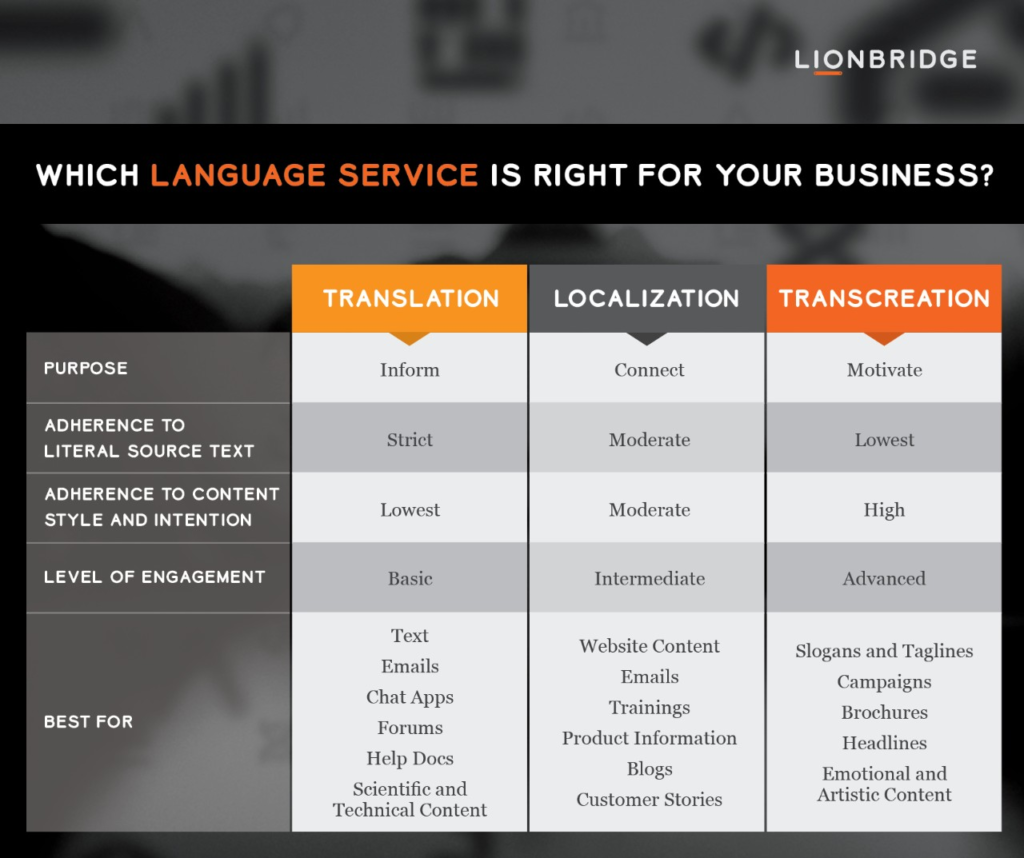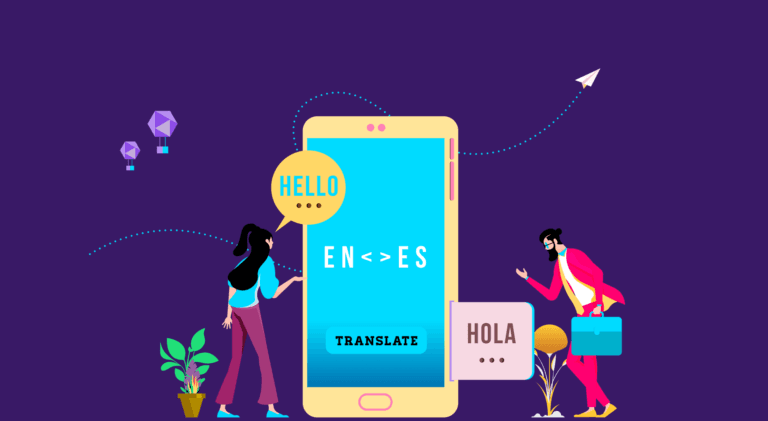How Translation And Localization Services Can Increase Conversion Rates Of Digital Content

Content translation and localization are important parts of any successful international marketing strategy. Understanding the nuances of different cultures and languages can be daunting, but effective translation can significantly increase the reach and success of any organization.
Professional translation and localization services provide an accurate and reliable way to communicate the desired message to the right audiences effectively. By ensuring that the translation is both accurate and culturally sensitive, such services can help ensure that a company’s message is not lost in translation. Proof: 86% of the localized campaigns outperformed the English campaigns in both click-throughs and conversions, according to Appia.
Professional translators who work in translation marketing are also knowledgeable about the culture, dialect, and nuances of the language they are translating. This expertise allows them to provide a more accurate translation that captures the original meaning and intent of the content.
Although English is the most commonly used language online, content should also be available in other languages. If you don’t translate your site material into the dialect of your intended audience, you risk losing out on purchase opportunities. Many users also favor websites that offer information in their local tongue. If the descriptions are written in a dialect they do not understand; customers are typically reluctant to order. Did you know that 72.4% of global consumers indicated that they prefer to use their native language when shopping online, according to Common Sensory Advice?

What is Language Localization within the Translation Industry
The technique of customizing a product, such as a good or service, for a sector or a consumer base in a particular area is known as localization. Similarly, language localization entails changing a product’s dialect to suit a certain market. Any company that wants to expand internationally and develop new sources of revenue from other markets must localize its language.
Moreover, customers like to engage with and purchase from companies they can speak with. Consider this: Would you buy something from an online site that was shown in a language you didn’t understand? It’s far simpler to go to a different store that speaks your own tongue. Irrespective of what you provide or the characteristics of your intended audience, your buyers most likely share these sentiments.
Language localization helps you with the following:
- Interacting with clients more successfully in circumstances where language could otherwise pose a barrier.
- Individuals are more inclined to engage and buy from you if they can grasp what you have to provide and how this will benefit them.
- Increased customer loyalty is also a result of customers being able to connect with your brand.

Why are Localization Services Important?
Localization and translation are frequently needed when launching new goods on an international market. Content is translated from one dialect into the other. Localization goes beyond simply translating already-existing information and marketing materials. Localization is essential since it forges a special connection with prospective clients. This is because the localization procedure requires comprehending how various cultures and marketplaces affect consumers’ purchasing decisions and does not just assume that you will succeed in your potential customers since you already exist in the market.
Localization aims to modify meaning to correspond with pertinent material for a particular market. Localization may also include various designs, translations to new measuring systems, time frames, economies, and different pictures to address language modifications.
Websites that take into account the cultural and linguistic variations among different markets and their preferred languages demonstrate that your business is aware of and respectful of their many cultures.
This increases client confidence. Great marketing translation services can give you adaptable and established branding, communication, and localized marketing content across international markets. It minimizes implementation complications and maximizes the impact of localization and translation.
How can Translation and Localization Services Help Increase Conversion Rates of Digital Content?
You might reach a new consumer base by having your website translated for people from various dialects. Localization extends even further, improving user experience, boosting conversion rates, and enabling you to interact with companies that might be a perfect match for a certain market. Depending on your company’s strategy, localization of translation marketing has different advantages.
For example, it will not be beneficial for retailers to localize website content in other areas until their physical stores are operational. On the contrary, e-commerce businesses that are prepared to deliver abroad may quickly identify potential markets by localizing the digital marketing approach.
It is not sufficient to translate the web content for localization. Additionally, you need to comprehend the societies you’re seeking to reach. This speaks to the essence behind digital marketing: to assist a company in selling a service or product, we must first comprehend the needs of its target sector. It could be vital to consider a more versatile digital marketing approach for two main reasons.
The first is that the marketplace for your present languages might already be overcrowded. For larger businesses that require being able to serve a variety of ethnicities, this is extremely critical. On the flip side, niche businesses exist where you may lack a sizable target market, but your prospective customers are dispersed over several languages. Since these markets frequently have significant margins, you must guarantee that consumers who speak diverse local languages receive a top-notch user experience.

Marketing translation and localization are essential in both scenarios and assist you in raising your profitability.
You may encounter companies that provide the same service or product since you serve similar customer bases. Finding a competitive edge is vital in markets that are oversaturated. You may set yourself apart from the competition in your sector by localizing and translating your material.
Brands rarely do language localization for international audiences. Many people believe that English would be sufficient, failing to see the clear benefits of speaking to customers in their own language.
When potential clients trust your website, they are more likely to convert to paying users. Making customers believe your business will surely lead to sales is your objective. You can achieve this by creating a setting where everything seems trustworthy and genuine. How can you build a comfortable and reliable environment?
Localize your material! Make sure that everything of the text on your webpage, including reviews, product descriptions, blog posts, landing pages, training resources, and labels, is written in the language of your intended audience.
When looking for services or products online, people use their local dialect. Following that, websites that are relevant to their search appear via SEO. Your webpage won’t appear if localization is not a component of your digital marketing plan.
In today’s global landscape, it is more important than ever to reach a wide variety of audiences with a localized, customized experience. Marketing translation and localization services make it possible to bridge the language gap and create content that resonates with foreign audiences.
With this in mind, it is necessary to find a translation provider that can meet the needs of the content creator, ensuring a high-quality final product. You may discover customers from all around the world with digital marketing. However, when expanding internationally, a single-track marketing plan won’t work. Therefore localization must be included in the marketing translation process if you run a worldwide business and want to be successful worldwide.
FAQs
Translation, as we all know, is the procedure of changing the content into different languages, however, localization encompasses much more. It considers the technical, ethical, social, and artistic aspects of adapting a website for users who speak other languages. In actuality, marketing translation is only one step inside the localization method.
Because there is such a high requirement for OTT platforms, upcoming translation systems would concentrate on providing more precise outcomes for live broadcasts or films. This innovation is used by businesses like YouTube to enhance published material for viewers everywhere around the world.
Initial translation of the entire content is the basic step of translating any document; it is like the first draft of a script, followed by vital steps of reviews, bilingual examinations, editing, etc. After thoroughly reviewing and revising the text, it undergoes proofreading and quality checks.
Latest Blogs
Learn how to rank on AI search engines like ChatGPT, Perplexity, and Gemini by optimizing your content for authority, structure, and relevance. Stay ahead in AI-driven search with this strategic guide.
Explore the best healthcare SEO services for your medical practice. Improve online visibility and effectively reach more patients in need of your services.
Discover top social media agencies specializing in banking solutions, enhancing financial services and driving engagement.
Get your hands on the latest news!
Similar Posts

Translation
5 mins read
All You Need to Know About Language Translation and Terminology Management

Translation
5 mins read
6 Reasons to Translate Content into German

Translation
5 mins read